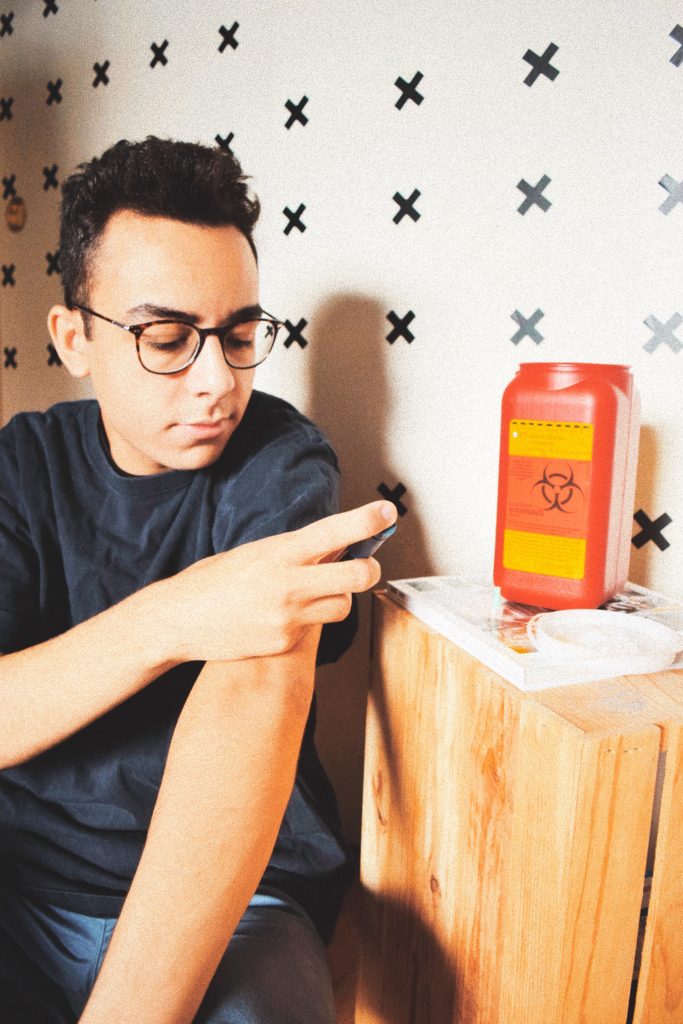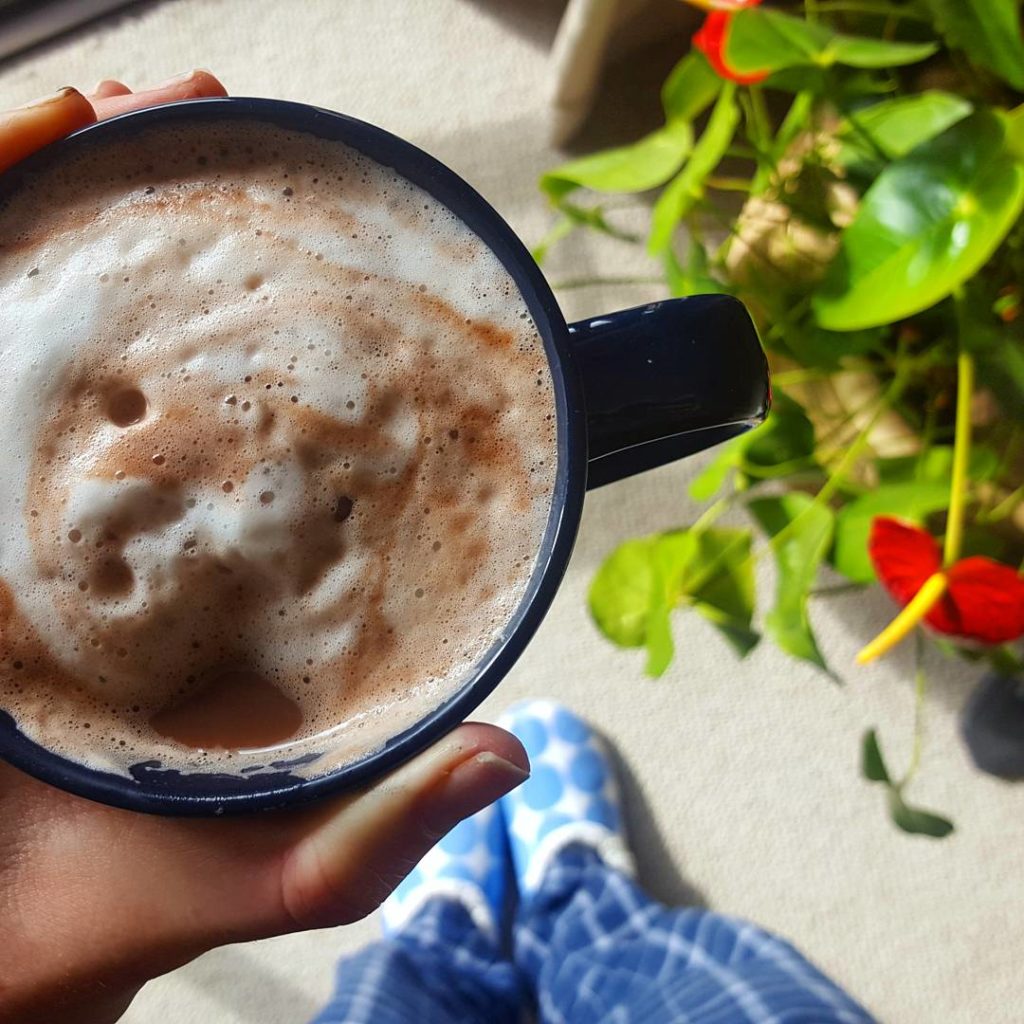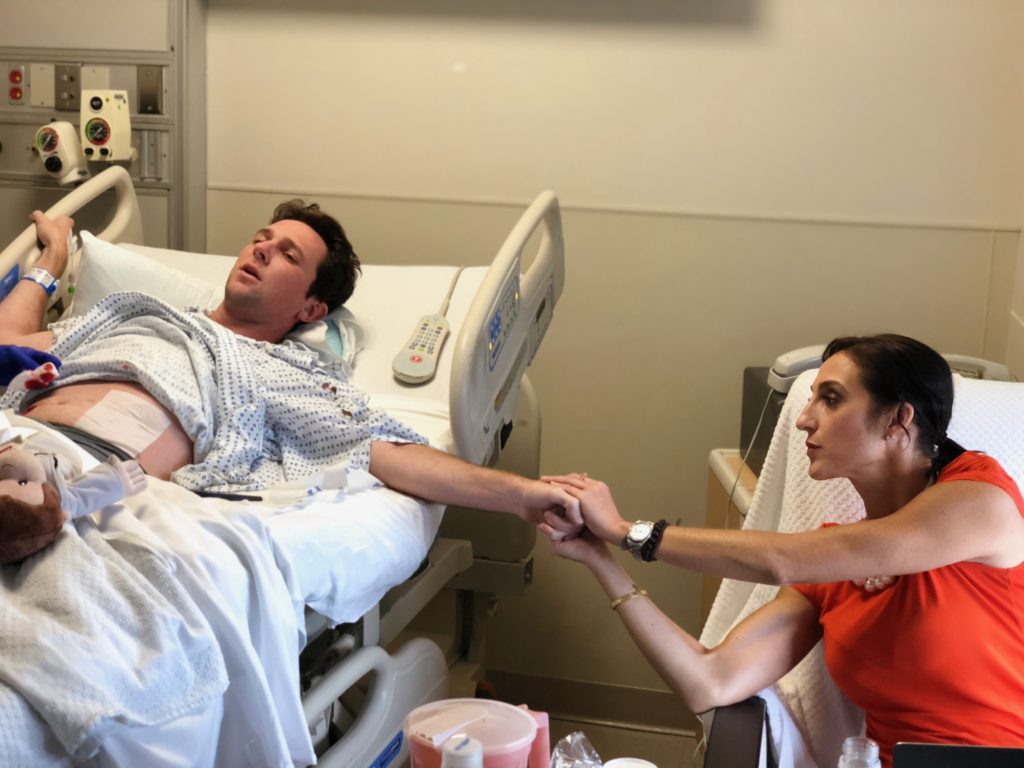QUESTION FOR FELLOW DIABETICS : HOW DO YOU DISPOSE OF YOUR USED NEEDLES?
This is one of THE MOST asked questions those of us with Diabetes often face.

MY JOURNEY TO SAFETY:
When I first got diagnosed with Type 1 Diabetes back in 2008, I vividly remember how unaware I was on the topic of safe needle disposal. I didn’t know of the harmful effects of throwing away used needles right into the trash.
Fast forward to one year after my diagnosis, I setup my very first pump at the age of 12! This opened up a whole new world that I never experienced before.
It can be pretty daunting when you’re 12 years old. I learned a whole encyclopedia’s worth of experiences. I learned everything from putting on my pump to how to wear it and even how to actually use it! I’d like to share with you my top tips for disposing needles safely.
My journey to safety was NOT an easy one! I had lots of trash that needed to be thrown away. A used needle and inserter were among that pile of trash, so without the knowledge I needed, I threw away my used needles in the trash!!!
MY TOP TIPS ON HOW TO DISPOSE NEEDLES SAFELY:
-
DO NOT THROW USED NEEDLES AND INSERTERS IN TRASH
-
ENLIST A PUMP TRAINER
- When I began my new world as a T1D, I constantly threw away my used needles in the trash. My pump trainer quickly caught me in the act of throwing the needles away unsafely and showed me how to break my long-term habit!
-
HAVE ACCESS TO A SHARPS CONTAINER:
- Unused needles go in a sharps container as well as used syringes, lancets, and any other form of needles.
Today, this is something that I am very passionate about. After educating myself on the dangers of disposing used needles the wrong way, I made it my goal to always have a sharps container in sight. Whether I am at home following a set routing or creating temporary plans for traveling-I always make sure to dispose safely!
-
LOCATE A SHARPS DISPOSAL ANYWHERE YOU ARE WITH SAFENEEDLEDISPOSAL.ORG
- I partnered with SafeNeedleDisposal.org to bring awareness on this very important topic. This website allows you to search for drop off locations in your area by zip code and teaches you how to safely store your used needles at home! Some areas even allow disposal in your household trash bin if placed in the proper container. I find that education is so very important since many may not be fully aware of the potential dangers in disposing their needles unsafely. As SafeNeedleDisposal.org states, the bottom line is that safety is the point.
HOW TO USE SAFENEEDLEDISPOSAL.ORG:
-
LOCATE DROP-OFF LOCATION:
- Use the site to locate the appropriate drop-off location in your area is so vital and so very convenient.
-
STORE UP USED NEEDLES:
- Store up all your used needles for a few months.
-
DESIGNATE A REGULAR DISPOSAL DAY:
- Designate a certain day to go out and dispose of your needles at your local drop-off location. You are not only bettering the environment, but your own health and safety as well.
Let’s be honest ,as Diabetics, we go through lots of needles, daily, weekly, monthly, and so on. Unfortunately, there is no cure for Diabetes yet, so we must insert pump sites, CGM sites, inject Insulin, and prick our fingers daily! Basically, we go through LOTS of needles and they need to go SOMEWHERE at the end of the day. By having designated areas and a great website to help us find those locations, it becomes a great way to dispose of needles both safely and efficiently.
Bottom line, safety is the point.
Live well,
Dave
 Anxiety and depression are prevalent for those who suffer from chronic illness. In fact, one study found that 40% of Inflammatory Bowel Disease (IBD) patients had abnormal anxiety levels and this drastically increases to 80% when the patient is in a flare-up . With chronic illness typically, there is a feeling of loss of control over your own life which can in turn cause stress, anxiety and depression.
Anxiety and depression are prevalent for those who suffer from chronic illness. In fact, one study found that 40% of Inflammatory Bowel Disease (IBD) patients had abnormal anxiety levels and this drastically increases to 80% when the patient is in a flare-up . With chronic illness typically, there is a feeling of loss of control over your own life which can in turn cause stress, anxiety and depression.
Chicken or Egg?
I was diagnosed with IBD 9 years ago and while I have learned to (mostly) manage the symptoms of my disease over time, I have yet to master the feelings of worry and anxiety. After having a bowel resection surgery, I have been in clinical remission but not without its bumps along the way. The fear of the unknown can do a number on one’s mental health. The possibility of a flare-up always lives in the back of my mind. I can remember the countless visits to the hospital, procedures, medications, and extreme pain. I was barely able to take care of myself, and now that I have children, I worry that if I were to have a flare-up, I wouldn’t be able to take care of them or participate in their lives in a meaningful way.
I know that having a chronic illness has increased my anxiety levels, but does stress and anxiety exasperate my symptoms? Research shows that stress can worsen symptoms and cause a relapse of remission. From WebMD “When someone is under stress, the body gears up for a fight-or-flight response by secreting certain hormones, including adrenalin, as well as molecules called cytokines. They stimulate the immune system, which triggers inflammation. In people whose ulcerative colitis is in remission, this sets the stage for the return of their symptoms, known as a flare-up.” This is something I’ve experienced and heard from talking to fellow chronic illness sufferers. Lack of quality sleep and environmental stressors have often caused a revival of symptoms which can be a slippery slope to a full-on flare.
Anxiety definition (from Merriam-Webster):
an abnormal and overwhelming sense of apprehension and fear often marked by physical signs (such as tension, sweating, and increased pulse rate), by doubt concerning the reality and nature of the threat, and by self-doubt about one’s capacity to cope with it.
Stress definition (from Merriam-Webster):
constraining force or influence: such a physical, chemical, or emotional factor that causes bodily or mental tension and may be a factor in disease causation
Anxiety = Fear
When speaking about Generalized Anxiety Disorder it is often associated with people who have irrational fears or worry for no reason. When talking about sufferers from chronic illness, often the anxiety is derived from perceived AND real fears. From my experience, my anxiety stems from a fear of a past trauma reoccurring. Fear of pain, a flare-up, of being out with no access to bathrooms. Fear of foods and eating, procedures, fear of damage caused by long term use of medications (i.e. Remicade can cause an increase in cancer). Fear of missing work, fear that people don’t understand, fear of drug/procedure costs and benefits coverage. This can be scary stuff and can plague your thoughts even when in remission.
From diagnosis to remission the fear still exists, it just changes in size and scope. A newly diagnosed patient can go through stages of grieving and without having the tools to manage the illness it can be very scary. Fast forward to remission, chronic illness has many layers and can be unpredictable. No matter how much you’ve done to manage your illness, there is still a possibility you can have a relapse. The feeling of helplessness can trigger depression, but on the flip-side depression can slow recovery. This begets a vicious cycle which can be hard to get under control.
Coping Physically and Mentally
Patients must cope with not just the disease itself but the mental health side effects of it. While I believe I’ve received excellent care from my Gastroenterologist, he deals with only clinical IBD symptoms so often the mental health aspect of the disease gets overlooked. It is important to bring up your emotional health to your doctor when suffering from a chronic illness despite the perceived stigma. Having that aspect under control could potentially help with physical symptoms. Anxiety and chronic illness can be a chicken and egg scenario where consideration must be given to both to have a holistic treatment plan.
Strategies for Coping With Anxiety:
Find your support: whether that be a close friend, family member, a fellow patient, or support group like Lyfebulb, knowing you aren’t in this alone makes a world of difference.
Don’t assume the worst: challenge those negative thoughts! Remember that you have survived thus far, and all those experiences make you stronger.
Try yoga, meditation, or deep-breathing: Research has shown this to be an effective complementary therapy for patients with IBD.
Seek counseling – an impartial third party can help instill coping techniques
SOURCES: [Sharma P, Poojary G, Dwivedi SN, Deepak KK. Effect of Yoga-Based Intervention in Patients with Inflammatory Bowel Disease. Int J Yoga Therap. 2015;25(1):101-12. doi: 10.17761/1531-2054-25.1.101. ]
Cannabis is an increasingly popular therapy for IBD with cannabidiol (CBD) showing promise as an anti-inflammatory and tetrahydrocannabinol (THC) as a pain reducer and sleep-aid. [Ahmed W, Katz S. Therapeutic Use of Cannabis in Inflammatory Bowel Disease. Gastroenterol Hepatol (N Y). 2016;12(11):668-679.]
– Krystal Laferriere, Lyfebulb Ambassador (Instagram @xtra_ordinary_girl )
Herbal remedies have been in use for centuries, and they are viewed as a more holistic approach to healthcare. While by no means should you disregard the importance of modern day medicine, herbal remedies are simply a natural approach you can take in order to deal with pain or any other chronic condition that you might be facing.

Three of these herbal treatments can include watching what you eat, drinking herbal tea, and purchasing the necessary vitamins. Of course, you also should not underestimate the importance of potentially combining this with more traditional medicine, especially depending on the severity of your health problem.
1. Watch what you eat
Your first priority is always to watch what you eat. Food is fuel for your body, and even if your diet has not caused your chronic condition, you can help alleviate any symptoms you experience by eating food that is good for you.
This means adopting a diet that is nutritious and well balanced above anything else. Cut out any sugar, as well as food that is overly processed and fried. You will not only start to feel better once you do this, but your mental health will improve as well. In essence, you are working towards feeling like your best self.

2. Drinking herbal tea
Herbal tea is something that you can purchase from anywhere, and it is yet another remedy that has been used for a long time to treat an illness or another condition.
Every single type of tea offers a different kind of benefit, although everything is rich in antioxidants, whether it’s green, white, oolong, purely herbal, or something else.
3. Purchasing the best vitamins and supplements
There are countless vitamins and supplements that you can purchase in order to assist you with any health problem that you might be facing, as well. Most importantly, however, you need to determine what the best source to purchase them from is.

In order to find all-natural products that are affordable, and that you can simply get delivered right to your doorstep, consider looking at companies that have already established themselves in this field, such as Swanson. Once you purchase the products that support your immune system and even assist with your respiratory health, among other areas of your physical wellbeing, you will be tremendously glad that you made the investment in the first place.
4. Combining it with medicine prescribed by your doctor
Depending on the severity of your chronic condition, the chances are that you will need to take medication prescribed by your doctor. However, why not combine this with other herbal approaches and remedies, particularly the ones outlined thus far? This type of approach is often guaranteed to help you get your health back on track.
Herbal medicine is affordable and easily accessible to everyone no matter where you are located. It predates current medicine, but as this article has already mentioned, that does not mean that you should disregard the importance of modern day medicine. Instead, think about what your options are for combining the two approaches, thereby adopting the best possible routine for your health.
Carers are very special people indeed. These are the ones who look after loved ones and friends who need assistance, and this can very often mean that their own lives become somewhat limited and difficult. Yet without these people, more and more people would have to go into long term care, so they are crucial in many ways.
If you know a carer, you should know that they are going to need support. They may not want to admit it, they may not even realize it, but they will need some help at some point along the way. Here are some of the times where carers are going to need assistance, and how you can help if possible.

Give Them A Break
Depending on the level of care required, a carer may be ‘on call’ 24 hours a day, seven days a week. This, of course, means that they never really get any rest, and they’re not able to do their own thing or take any time for themselves. They don’t get to meet up with friends, go to the store, have a meal out, or simply go for a walk or to the gym.
If you can step on for a little while and sit with the person they are caring for so that they can go out, leave the house, and re-set their mental state, you could be helping them hugely. Going on for too long without a break can easily lead to physical exhaustion as well as mental issues like depression. If you notice any of the symptoms of depression or anxiety, for example, the carer may need medication assisted treatment but could be reluctant to be away from their ward for too long. You can help by arranging respite care, or similar assistance.
Help With Caring
Carers are often untrained and have no medical experience, and although they do what they do out of love, depending on the condition of the person they are caring for, additional medical help could be needed as well.
It might be that a nurse needs to come in once or twice a day, for example, or that a physical therapist visits to do work that the carer is unqualified to do.
Help With Household Chores
Caring can certainly be a fulltime job, and that can mean that household chores go unattended because there is just no time to clean up and make things look nice when there is a patient to care for.
Having someone come in to put the vacuum cleaner around, to dust, to clean the kitchen and the bathroom, or perhaps to cook meals (or bring round home-cooked meals that can be frozen and heated up when needed) is a wonderful way to help out a busy carer. You can hire professionals to do the job, or you – and perhaps a few other friends – can visit and take on the task yourself.
Someone To Talk To
Sometimes the carer simply needs someone to talk to. It’s a hard life, and although they are mostly happy to do the work, that doesn’t mean that they won’t want to rant and express their feelings once in a while. Being there to listen and to offer advice if required can be the very best support you can offer.

Are you feeling bored right now? Do you feel bored very often? Finding ways to overcome such moments can be challenging. There’s nothing wrong with being bored, in fact, it’s good for your wellbeing. However, when you feel this way too often life can get depressing. There are lots of things you can do to stop feeling bored. It’s about channeling your creativity, being productive, completing tasks you’ve been putting off for a while or learning a new skill. Finding ways to have fun with friends and family is another great way to combat boredom.
Be Creative
There are lots of different things you can do if you want to be more creative. Reading a book is a brilliant way to forget you’re feeling bored. Lose yourself in another world or read about other people’s life experiences. Read a book and no matter the genre you will learn something new.
How about coloring, painting, sketching or doodling something? If you’re not really sure whether you’ve got the talent for painting or drawing, sign up for classes and learn how to do it.
Have you thought about making a list of the things you want to do? Creating a bucket list is a good way to pass the time and give yourself some incentive to get things moving. Along the same lines as creating a list why not do some creative writing? It’s said there’s a book in everyone so take up the challenge and put pen to paper.
What do you do when friends and family have a birthday? Do you rush to the store and pay money for a gift? Making gifts for people is another meaningful thing to do and put your mind to.
Be Productive
If you’re feeling bored, you’re also going to feel unmotivated and listless. To overcome these feelings, you need to have an end goal to focus on. That goal could take the form of improving your professional qualifications or finishing your end of term paper. Keeping your body active will also keep your mind active, thereby easing the boredom. It doesn’t have to be a strenuous activity; a walk in the park works just as well.
If you can find yourself a new hobby it’s going to provide you with many hours of productive entertainment. Learn how to play an instrument, speak another language, paint, cook, or learn about gardening.
Socialize More
If you’ve got people around you to communicate and have fun with there is going to be less boredom in your life. You don’t have to connect with these people face-to-face as the internet provides lots of opportunities for socializing. You could play online games together, for example.
Is there a local coffee shop you can go to and meet your friends? Share stories over a coffee and relax together. Vaping is an activity that is allowed outside many coffee shops in their al fresco dining area so bring your vape along and don’t be worried about your friends wanting to leave because of the smell of cigarette smoke. Ultimate Juice, for example, sells a range of sweet smelling and unusual e-liquids you can try.
Have Fun
Did you know that many people find baking a relaxing activity and it will certainly take up a few hours of your time? You may already have the ingredients you need to bake up a storm and then invite your mates around for coffee. Whatever you find fun, find ways to further your skills in that activity. Baking gives you a finished product you can enjoy, and be proud of, and can also be used to entice your friends over more regularly.
